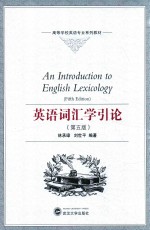图书介绍
英语词汇学引论 第5版pdf电子书版本下载

- 林承璋,刘世平编 著
- 出版社: 武汉:武汉大学出版社
- ISBN:7307167018
- 出版时间:2016
- 标注页数:367页
- 文件大小:40MB
- 文件页数:377页
- 主题词:英语-词汇-高等学校-教材
PDF下载
下载说明
英语词汇学引论 第5版PDF格式电子书版下载
下载的文件为RAR压缩包。需要使用解压软件进行解压得到PDF格式图书。建议使用BT下载工具Free Download Manager进行下载,简称FDM(免费,没有广告,支持多平台)。本站资源全部打包为BT种子。所以需要使用专业的BT下载软件进行下载。如 BitComet qBittorrent uTorrent等BT下载工具。迅雷目前由于本站不是热门资源。不推荐使用!后期资源热门了。安装了迅雷也可以迅雷进行下载!
(文件页数 要大于 标注页数,上中下等多册电子书除外)
注意:本站所有压缩包均有解压码: 点击下载压缩包解压工具
图书目录
Chapter 1 Language,Linguistics and Lexicology 1
1-1-1 Introductory Remarks 1
1-1-2 A Definition of Language 1
1-1-3 Language,Society and Thought 2
1-2-1 A Definition of Linguistics 4
1-2-2 The Scope of Linguistics 4
1-3-1 What Is Lexicology? 5
1-3-2 Aims and Significance of the Course of English Lexicology 5
1-3-3 The Connection of Lexicology with Other Branches of Linguistics 6
1-3-4 Two Approaches to the Study of English Lexicology 7
Chapter 2 The Sources of the English Vocabulary 10
2-1-1 What Is Etymology? 10
2-1-2 The English People and the English Language 10
2-1-3 The Position and Character of the English Language in the Indo-European Family 11
2-1-4 The Divisions of the History of the English Language 11
2-1-5 Some Characteristics of Old English 12
2-1-6 Some Characteristics of Middle English 16
2-1-7 Some Characteristics of Modern English 18
2-1-8 Etymological Twins in English 23
2-1-9 Some Combining Forms Used in Modern English 26
2-2-1 Words of Native Origin 30
2-2-2 Borrowed Words in the English Vocabulary 32
2-3-1 The Foreign Elements in the English Vocabulary 34
2-3-2 The Scandinavian Element in the English Vocabulary 35
2-3-3 The French Element in the English Vocabulary 36
2-3-4 The Latin Element in the English Vocabulary 39
2-3-5 The Greek Element in the English Vocabulary 42
2-3-6 The Influence of the Classical Elements upon the English Vocabulary 42
2-3-7 Other Foreign Elements in the English Vocabulary 44
2-3-8 The Interrelation Between the Native and Foreign Elements in the English Vocabulary 45
2-3-9 The Linguistic and Historical Origins of Some Common English Words 46
Chapter 3 Word Meaning and Semantic Relations 53
3-1-1 Some General Remarks on Semantics and Meaning 53
3-1-2 The Relationship Between Meaning and the Object 55
3-2-1 What Is a Word? 56
3-2-2 Meaning and Motivation 57
3-3-1 Classifications of Words 58
3-3-2 Main Types of Word Meaning 60
3-3-3 Word Meaning and Context 63
3-4-1 Synonyms 65
3-4-2 Antonyms 70
3-4-3 Polysemy and Homonymy 74
3-4-4 Hyponymy 80
Chapter 4 The Changing English Vocabulary 82
4-1-1 The Constant Change in Language and the Continuous Appearance of Neologisms 82
4-1-2 The Definition of Neologisms or New Words 83
4-1-3 The Rate of Changes of the English Vocabulary 84
4-1-4 The Sources of New Words 84
4-1-5 The Formation of Neologisms 100
4-2-1 Archaisms 109
4-3-1 Changes in Meaning 112
4-3-2 Four Tendencies in Semantic Changes 114
4-3-3 Semantic Changes from the Literal Use of Words to Their Figurative Use 121
Chapter 5 Word-formation in English 135
5-1-1 Introduction 135
5-1-2 Morphological Structure of Words 135
5-1-3 Two Types of Morphemes 136
5-1-4 Three Types of Words 137
5-1-5 Root,Base,Stem 137
5-2-1 The Main Processes of English Word-formation 143
5-2-2 The Minor Processes of English Word-formation 208
Chapter 6 English Idioms 220
6-1-1 Introduction 220
6-1-2 The Definition of Idioms 220
6-1-3 The Significance of Studying English Idioms 221
6-1-4 The Features of English Idioms 222
6-1-5 English Idioms in Different Styles 225
6-1-6 The Difference Between Idiomatic and Free Phrases 227
6-2-1 Classifications of English Idioms 228
6-2-2 Some Useful Language Areas of Idioms 243
Chapter 7 English Collocations 258
7-1-1 Introduction 258
7-1-2 What Is a Collocation? 258
7-1-3 The Importance of Learning English Collocations 259
7-2-1 The Classification of English Collocations 261
7-2-2 Register Used in English Collocations 274
7-3-1 Some Commonest Words Used in English Collocations 275
7-4-1 Different Subjects of English Collocations 280
7-4-2 Families 280
7-4-3 Houses,Flats and Rooms 282
7-4-4 Food and Drink 288
7-4-5 Study and Learning 289
7-4-6 Fitness and Illness 290
7-4-7 Job and Work 291
7-4-8 Computers 295
7-4-9 Sport 297
7-4-10 Time 300
Chapter 8 British and American English 303
8-1-1 English as a Language of Worldwide Use 303
8-1-2 British and American English 304
8-1-3 The Historical Background of American English 306
8-2-1 Differences between British English and American English 308
8-2-2 Differences in Individual Sounds 308
8-2-3 Differences in Stress 310
8-2-4 Differences in Spelling 310
8-2-5 Differences in Vocabulary 311
8-2-6 Differences in Grammar 320
8-3-1 A Comparison Between Webster's Pronunciation Symbols(WPS)and International Phonetic Alphabet(IPA) 323
8-3-2 British and American English in the Future 330
Chapter 9 English Dictionaries and How to Use Them 332
9-1-1 What Is a Dictionary? 332
9-1-2 Characteristics of Dictionaries 334
9-2-1 Types of Dictionaries 335
9-2-2 Monolingual,Bilingual and Multilingual Dictionaries 335
9-2-3 General and Special Dictionaries 335
9-2-4 Pocket,Medium-sized and Unabridged Dictionaries 336
9-2-5 Synchronic and Diachronic Dictionaries 337
9-2-6 Encyclopedias and Encyclopedic Dictionaries 337
9-2-7 The Printed and Electronic Dictionaries 338
9-3-1 The History of English Dictionaries 339
9-3-2 A Brief Introduction of Five Newest English Dictionaries 341
9-3-3 Five Periods in the History of English Dictionaries 346
9-4-1 How to Use English Dictionaries 347
Appendix 1 An English-Chinese List of Technical Terms of Lexicology Used in This Book 354
Appendix 2 The Review of a Newest Book 362
Bibliography 363